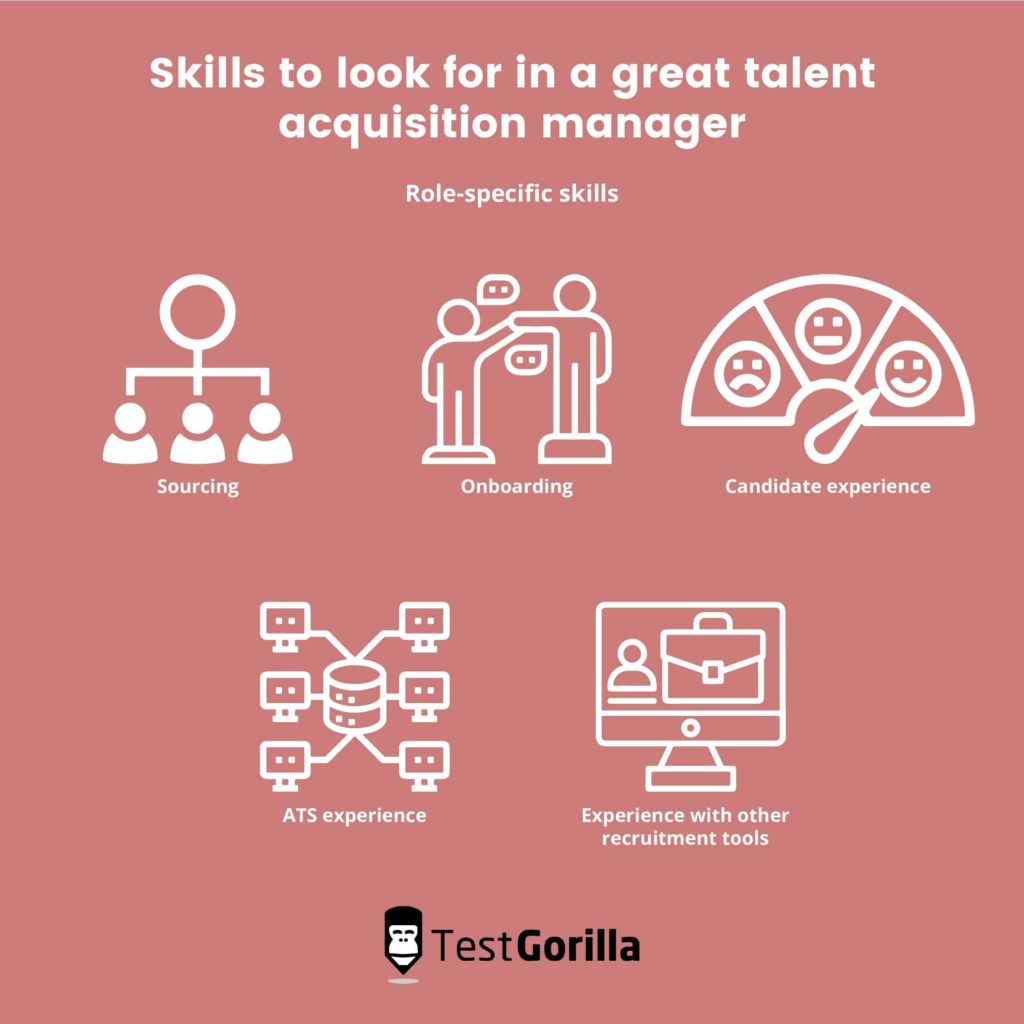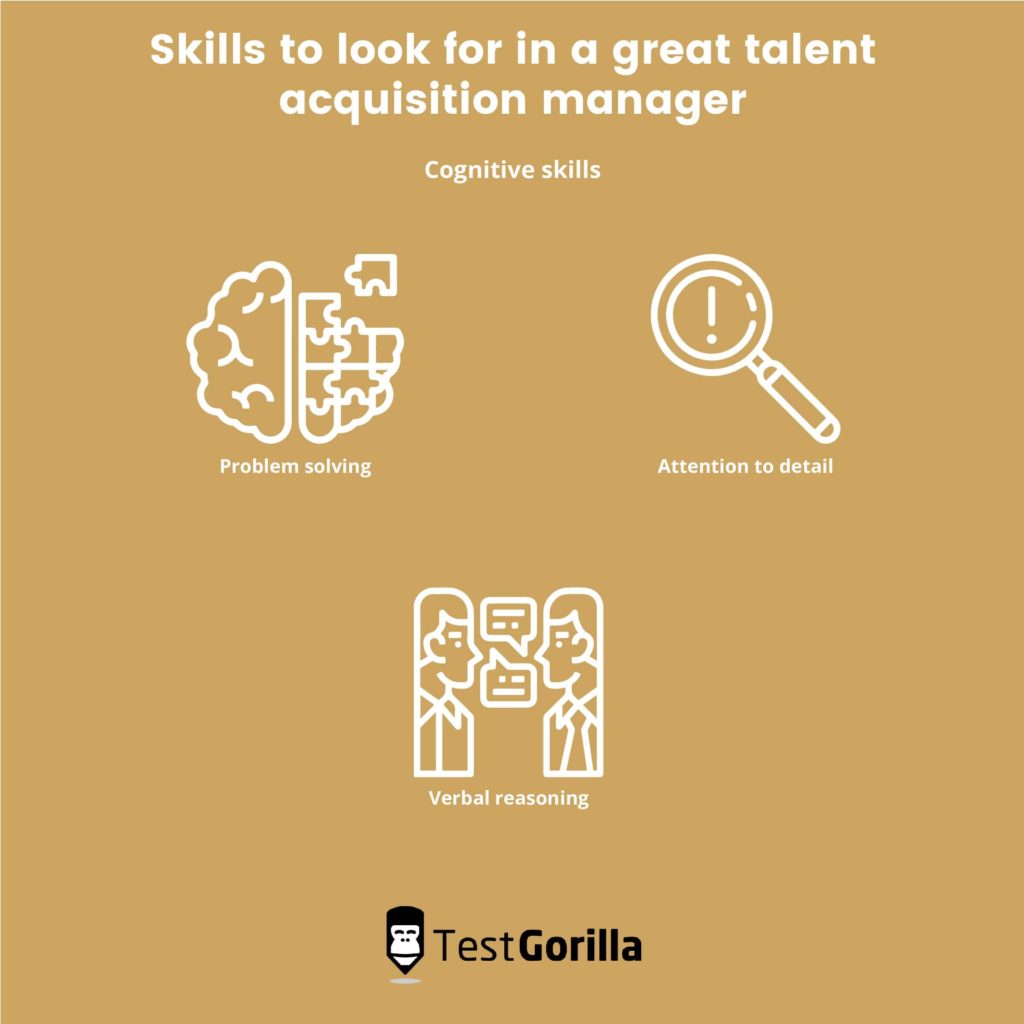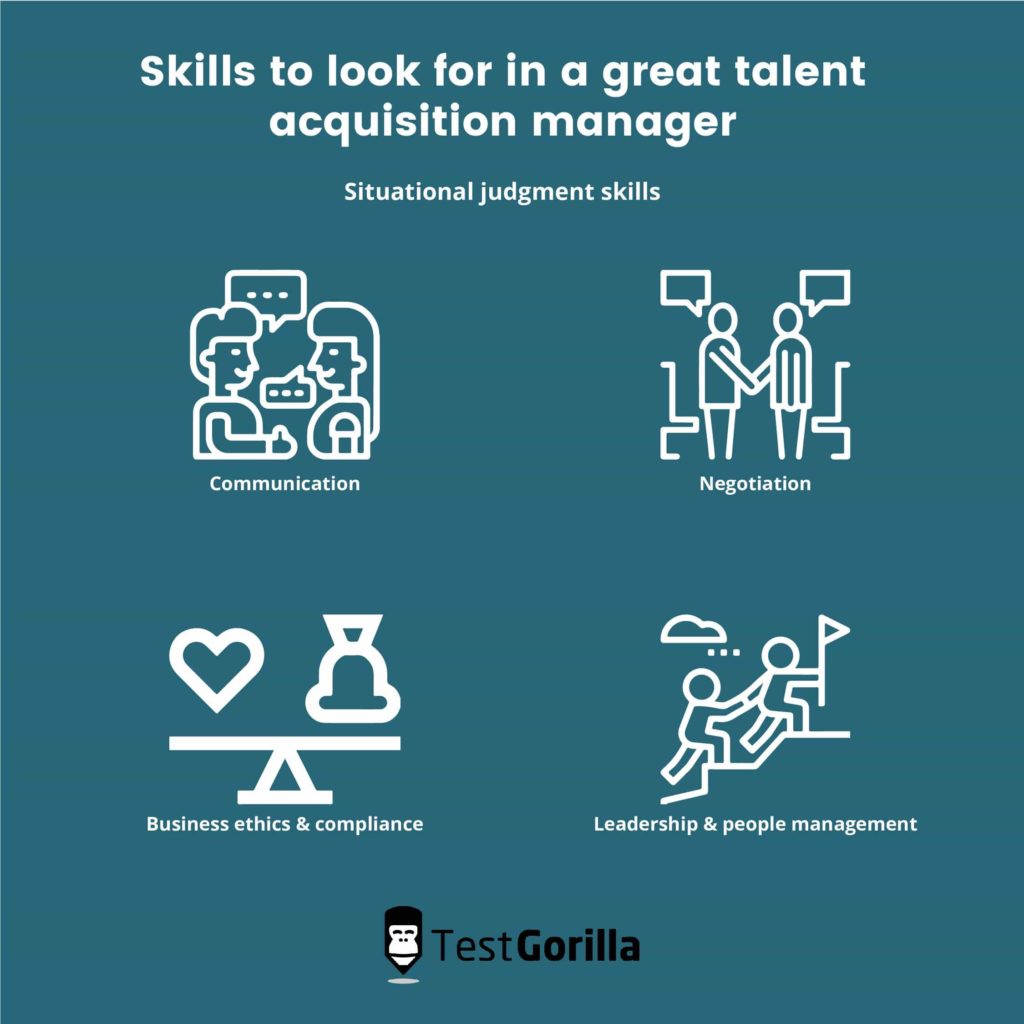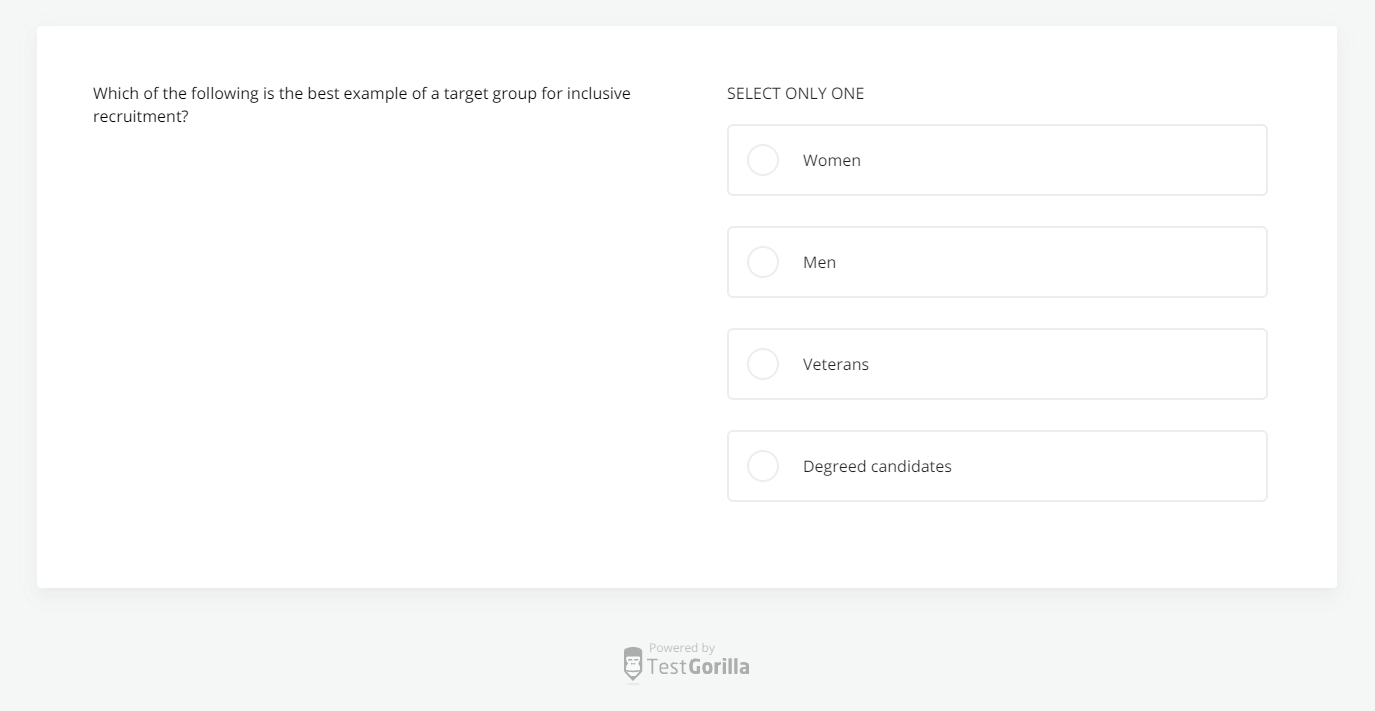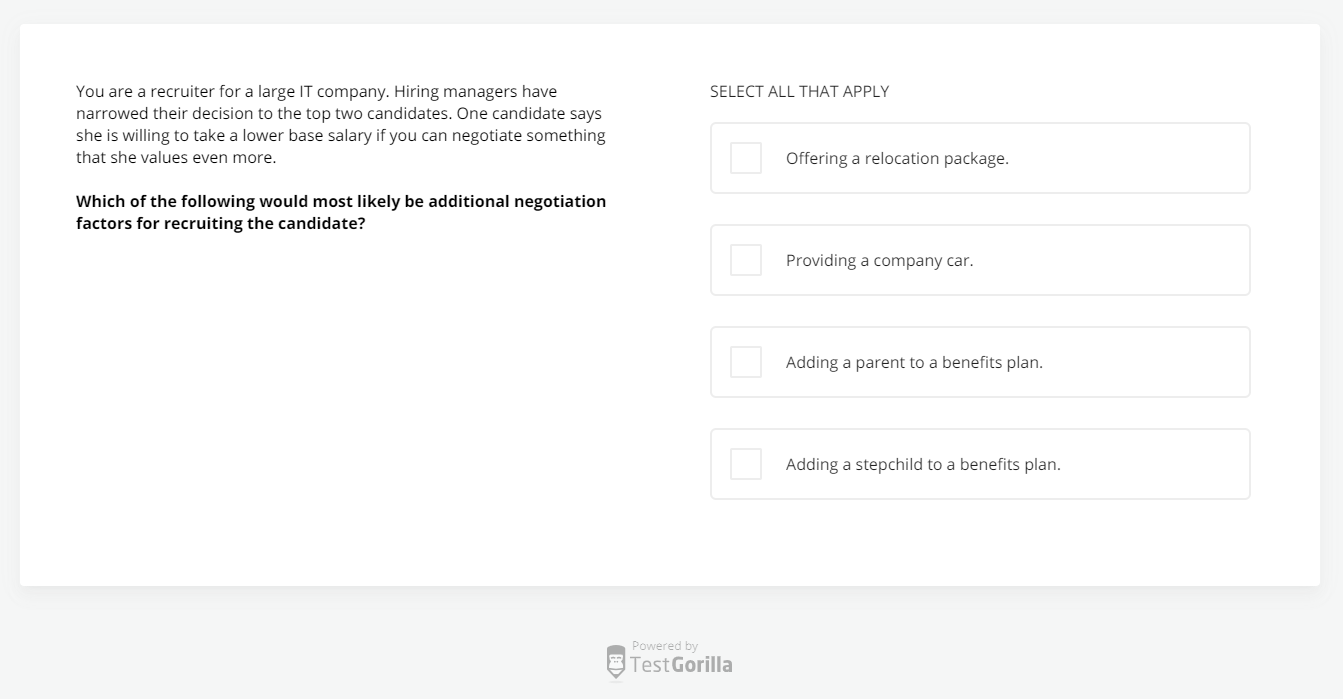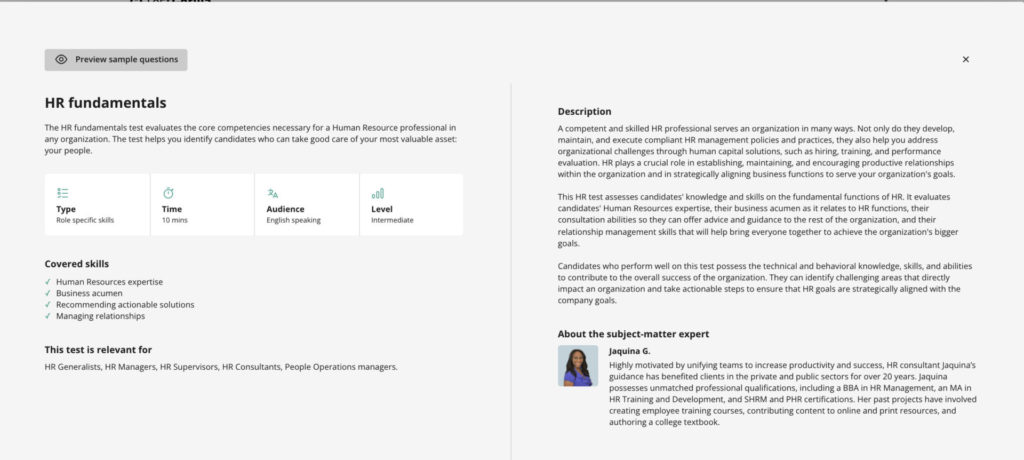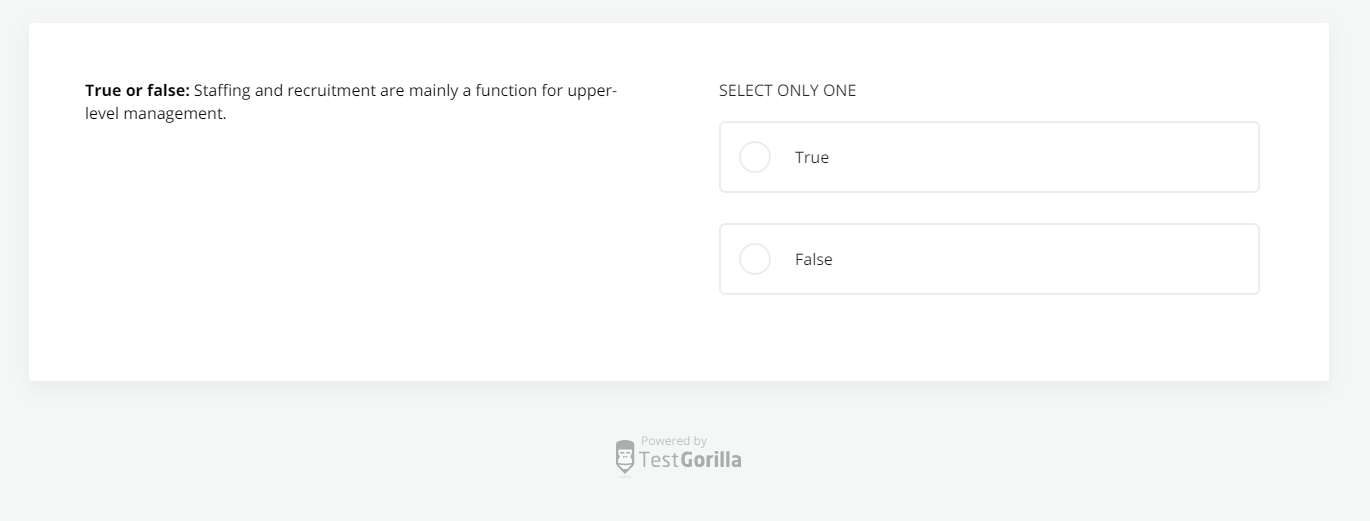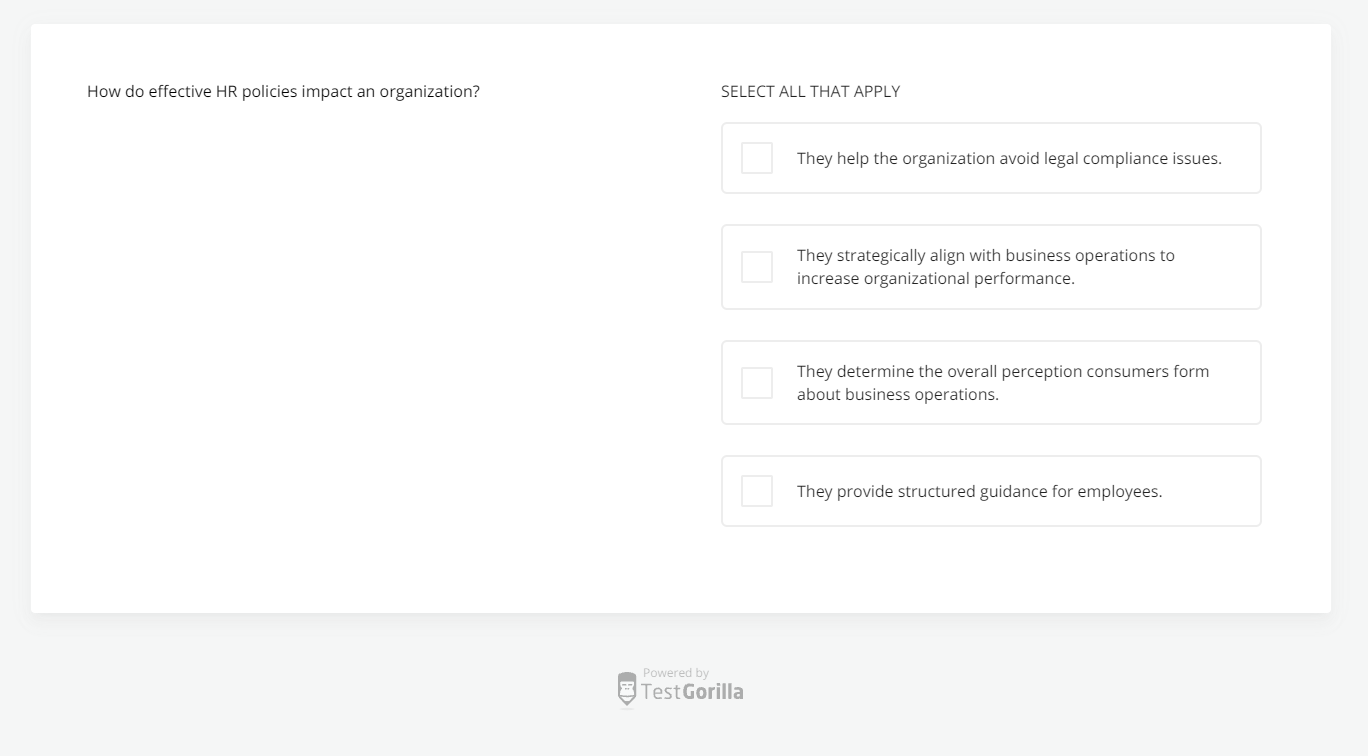Once your company hits the growth stage in which you find yourself with dozens of open roles, it’s time to hire a talent acquisition manager.
While it’s not necessarily a senior role, your talent acquisition manager is the gateway to your organization. Not only are they the smiling face that greets candidates for the first time, but they also make the key decisions about who makes up your organization and who doesn’t.
If your people make your company, and your talent acquisition manager finds your people, then your talent acquisition manager makes your company.
Clearly, your first talent acquisition manager hire is a big one.
But how do you hire a talent acquisition manager when you don’t have a… talent acquisition manager?
In this article, we’ll discuss the skills to look for in a talent acquisition manager.
We’ll also show you how you can use TestGorilla’s free pre-employment assessments to test these skills so that you’re confident about hiring the right person to move the talent needle in your organization.
Table of contents
What is talent acquisition?
Talent acquisition is a company’s strategic and tactical approach to attracting the right people to the organization.
Talent acquisition includes all the strategies and tactics required to fill open roles such as sourcing talent, nurturing relationships, screening and assessing candidates, interviewing, hiring, and onboarding employees.
To understand talent acquisition, it helps to contrast it with other roles, such as recruitment and HR.
Talent acquisition vs. recruitment
What’s the difference between talent acquisition and recruitment?
Many organizations use talent acquisition and recruitment as interchangeable terms. However, recruitment is technically a subset of talent acquisition.
Recruitment is all about filling open roles. It’s primarily tactical, involving all the day-to-day activities of finding and hiring candidates, such as:
Talent acquisition is broader and more strategic in scope. It includes all of the above, plus:
Recruitment marketing
While recruitment is about filling empty seats, talent acquisition is about building a proactive, long-term strategy for identifying and attracting top candidates.
Talent acquisition vs. HR
That expansive list of talent acquisition responsibilities probably has you thinking, “What’s the difference between talent acquisition and HR?”
Talent acquisition is a subset of HR.
In addition to talent acquisition, HR is responsible for talent management — the engagement of current employees. This includes managing promotions, employee retention, boosting morale, coaching and development, and other activities to help employees reach their potential within an organization.
HR is also responsible for compliance with labor laws, payroll, and other administrative activities.
Talent acquisition manager vs. talent acquisition specialist vs. recruiter
Before you start adding to your talent acquisition team, it’s key to understand the different talent roles and how they may best fit within your organization.
Here’s a quick summary of each role in order of seniority:
Talent acquisition manager: A talent acquisition manager is typically a mid-senior position who manages your talent acquisition team and strategy. At larger companies, the talent acquisition manager will focus more heavily on strategy. For example, they’ll determine which open roles are a higher priority for the organization. In smaller companies, the talent acquisition manager will balance strategy with day-to-day, hands-on recruitment activities.
Talent acquisition specialist: A talent acquisition specialist is responsible for executing your talent acquisition strategy. Their responsibilities include sourcing, identifying, assessing, interviewing, hiring, and onboarding employees. They may also assist their manager with developing recruitment strategies and employer branding.
Recruiter: Recruiters have responsibilities that overlap with those of talent acquisition specialists, which is why many organizations conflate the two titles. As we discussed above, the main difference is that recruiters’ role, similarly to the role of a headhunter, is narrower in scope, focusing only on sourcing candidates and taking the necessary actions to move them through the recruitment pipeline.
Skills to look for in a great talent acquisition manager
Talent acquisition demands a lot from one person. The individual has to be a people person, a great listener and communicator, a savvy negotiator, a marketer, a technology power user, and a multi-tasker extraordinaire.
Whether you decide to hire a talent acquisition manager, specialist, or recruiter, you’ll have to find a candidate with a wide array of skills.
These skills can be broken down into three categories:
Role-specific skills
Cognitive skills
Situational judgment skills
Here’s an exploration of each category.
Role-specific skills
Ideally, your new talent acquisition manager will have plenty of on-the-job experience. Necessary role-specific skills include:
Sourcing: Candidate sourcing is the active outreach required to get candidates in your recruitment pipeline. According to a 2016 LinkedIn survey, most people are open to hearing about vacant roles, but only 36% of people actively look for new positions. Therefore, there’s gold to be mined. An experienced talent acquisition manager should have experience with candidate sourcing.
Onboarding: Onboarding is an often-forgotten aspect of talent acquisition. An effective onboarding process improves retention, increases engagement, and improves productivity. Your talent acquisition manager should have some demonstrable experience onboarding and training teams.
Candidate experience: Your talent acquisition manager has to show off your company as a desirable place to work. Knowing how to create an attractive careers page, write great job descriptions, and provide first-rate communication to applicants is a must for the role.
Applicant Tracking System experience: Talent acquisition managers practically live within their applicant tracking system (ATS). They use an ATS to communicate with candidates, assess applicants, create actionable reports, and much more. Knowing how to leverage an ATS is key to winning quality talent.
Experience with other recruitment tools, too: It’s not all about the ATS. There are tons of recruitment tools out there. The more tech-savvy your talent acquisition manager, the better.
To learn more about skills for recruiters, check out our article on the 8 most important recruitment skills.
Cognitive skills
Role-specific skills are about what you know. Cognitive skills are about how you think. Talent acquisition managers must be strong in the following areas:
Problem solving: Talent acquisition managers will encounter novel situations almost every day. They need the ability to make quick, sound decisions based on the information at hand.
Attention to detail: Whether it’s for spotting inconsistencies in job descriptions or spotting red flags in candidate applications, attention to detail is a must-have skill for talent acquisition managers.
Verbal reasoning: Talent acquisition managers must have a strong grasp of language. This means being able to draw reason from facts and communicate meaning clearly, both verbally and in writing.
Situational judgment skills
HR employees of all stripes require situational judgment skills to make smart decisions in often uncertain circumstances. For talent acquisition managers, key skills include:
Communication: Most of a talent acquisition manager’s role requires communicating with others. They must be an active listener, interpret non-verbal cues, summarize information effectively, and use professional communication etiquette.
Negotiation: Talent acquisition managers will often be the lead on salary and compensation negotiations, so they must be able to drive discussions, influence people, use emotional intelligence, and understand the psychology of their counterparts.
Business ethics & compliance: Talent acquisition comes with its fair share of potential ethical issues, conflicts of interest, anti-harassment or anti-discriminatory policies, and legal violations. Therefore, talent acquisition managers must have a strong grasp of business ethics and compliance standards.
Leadership & people management: Even if your talent acquisition manager doesn’t have a direct report, they are likely to employ leadership and people management skills when interacting with other people managers and employees. For example, they may need to coach other people leaders on leadership best practices.
Recommended reading: Your hiring team’s guide to situational judgment tests
Unfortunately, these are some of the toughest skills to judge based on a resume and interviews alone.
Thankfully, TestGorilla is here to help.
How to use TestGorilla to hire a talent acquisition manager
Because talent acquisition managers require such a diverse array of skills, it can be tough to tell if a candidate has the necessary chops for the role.
While you can get part of the story from scanning a candidate’s resume or asking savvy behavioral interview questions, the best way to be certain about their skillset is to test their abilities with pre-employment assessments.
Pre-employment assessments are packages of screening tests that evaluate a candidate on both the hard and soft skills necessary for their role.
There are tons of benefits of pre-employment testing:
Identify top candidates: Objective measurements make it easier to compare top candidates side by side.
Speed up screening: Testing candidates when they apply reduces the need to screen hundreds of resumes.
Predict job performance: Using a combination of testing and interviewing is shown to correlate best with job performance.
Eliminate bias: Testing a candidate on their skills rather than making subjective judgments reduces bias in your hiring process.
Impress your candidates: A thorough hiring process shows candidates — especially talent acquisition managers — that you’re serious about finding the right people.
Using TestGorilla’s free plan, you can create assessments with up to five tests. You can choose to use these assessments as the first point of screening or to assess your top candidates.
To make it easier to hire talent acquisition professionals, TestGorilla created two role-specific tests for recruiters: the Talent Acquisition Test and the HR Fundamentals test.
Both tests were designed by Jaquina G. — an HR consultant with a BBA in HR Management, an MA in HR Training and Development, and SHRM and PHR certifications — and then peer reviewed by another HR expert to ensure maximum impact.
The Talent Acquisition test
Talent Acquisition test in TestGorilla
The Talent Acquisition test evaluates candidates on four key skills necessary for moving candidates through the talent acquisition pipeline:
Sourcing
Candidate experience
Recruitment analytics
Onboarding
This makes the test useful for recruiting talent acquisition professionals of all levels, whether you’re looking for a recruiter, specialist, manager, or an HR role that’s strongly focused on talent acquisition.
To give an example, here’s a preview question about inclusive hiring:
The test also covers topics such as negotiation factors:
By using this test, you’ll be able to confirm the candidate’s on-the-job knowledge outlined in their resume.
To see more of the Talent Acquisition test, check out a free preview here.
The HR Fundamentals test
HR Fundamentals test in TestGorilla
The HR Fundamentals test can also help you evaluate the core competencies of a talent acquisition candidate. The test assesses candidates on the following skills:
Human resources expertise
Business acumen
Recommending actionable solutions
Managing relationships
The test was designed for HR candidates of all types and seniorities, but also applies to talent acquisition candidates as it assesses their knowledge of HR policies and key job functions.
For example, you can test a candidate’s knowledge of recruitment roles and responsibilities:
The test also asks more general questions about the function of HR:
To see more of the HR Fundamentals test, check out a free preview here.
Other tests to round out your assessment
A full pre-employment assessment includes more than role-specific tests. The TestGorilla test library features 150+ tests to help you build out a rounded assessment.
The free TestGorilla plan allows you to use up to 10 tests across your assessments, with up to five tests used in a single assessment.
What other tests might you include to round out your talent acquisition manager assessment?
Cognitive ability tests are proven to correlate strongly with job performance when used in combination with other common recruitment tactics. Therefore, we recommend including one or more of these relevant cognitive ability tests:
You can include one or more situational judgment tests such as:
Hire the best talent with TestGorilla
Hiring an awesome talent acquisition manager is the gift that keeps on giving. This role sets the tone for your organization, creating a compounding effect that allows you to hire increasingly better candidates over time.
TestGorilla makes hiring a talent acquisition manager easy. Sign up for a free TestGorilla account now to get started.
Related posts
Hire the best candidates with TestGorilla
Create pre-employment assessments in minutes to screen candidates, save time, and hire the best talent.
Latest posts
The best advice in pre-employment testing, in your inbox.
No spam. Unsubscribe at any time.

Hire the best. No bias. No stress.
Our screening tests identify the best candidates and make your hiring decisions faster, easier, and bias-free.
Free resources
This checklist covers key features you should look for when choosing a skills testing platform
This resource will help you develop an onboarding checklist for new hires.
How to assess your candidates' attention to detail.
Learn how to get human resources certified through HRCI or SHRM.
Learn how you can improve the level of talent at your company.
Learn how CapitalT reduced hiring bias with online skills assessments.
Learn how to make the resume process more efficient and more effective.
Improve your hiring strategy with these 7 critical recruitment metrics.
Learn how Sukhi decreased time spent reviewing resumes by 83%!
Hire more efficiently with these hacks that 99% of recruiters aren't using.
Make a business case for diversity and inclusion initiatives with this data.

